University Project Management: Advanced Topics Report
VerifiedAdded on 2022/12/01
|23
|6495
|51
Report
AI Summary
This report delves into the critical factors that influence project planning, providing a comprehensive analysis of scope management, communication management, and schedule management. It examines the deliverables associated with each factor, highlighting the roles and responsibilities of project managers and team members in ensuring successful project outcomes. The report also addresses the potential risks inherent in each area, emphasizing the importance of proactive planning and risk mitigation. The discussion includes a detailed exploration of how these factors impact the project planning process, covering aspects such as scope definition, communication strategies, and schedule adherence. Furthermore, the report emphasizes the importance of setting SMART goals and identifying key performance indicators (KPIs) to measure project success. Overall, the report provides valuable insights into effective project management strategies and methodologies, offering practical recommendations for improving project outcomes.

Running head: PM
Advanced Topics in Project Management
Name of Student
Name of University
Author Note
Advanced Topics in Project Management
Name of Student
Name of University
Author Note
Paraphrase This Document
Need a fresh take? Get an instant paraphrase of this document with our AI Paraphraser
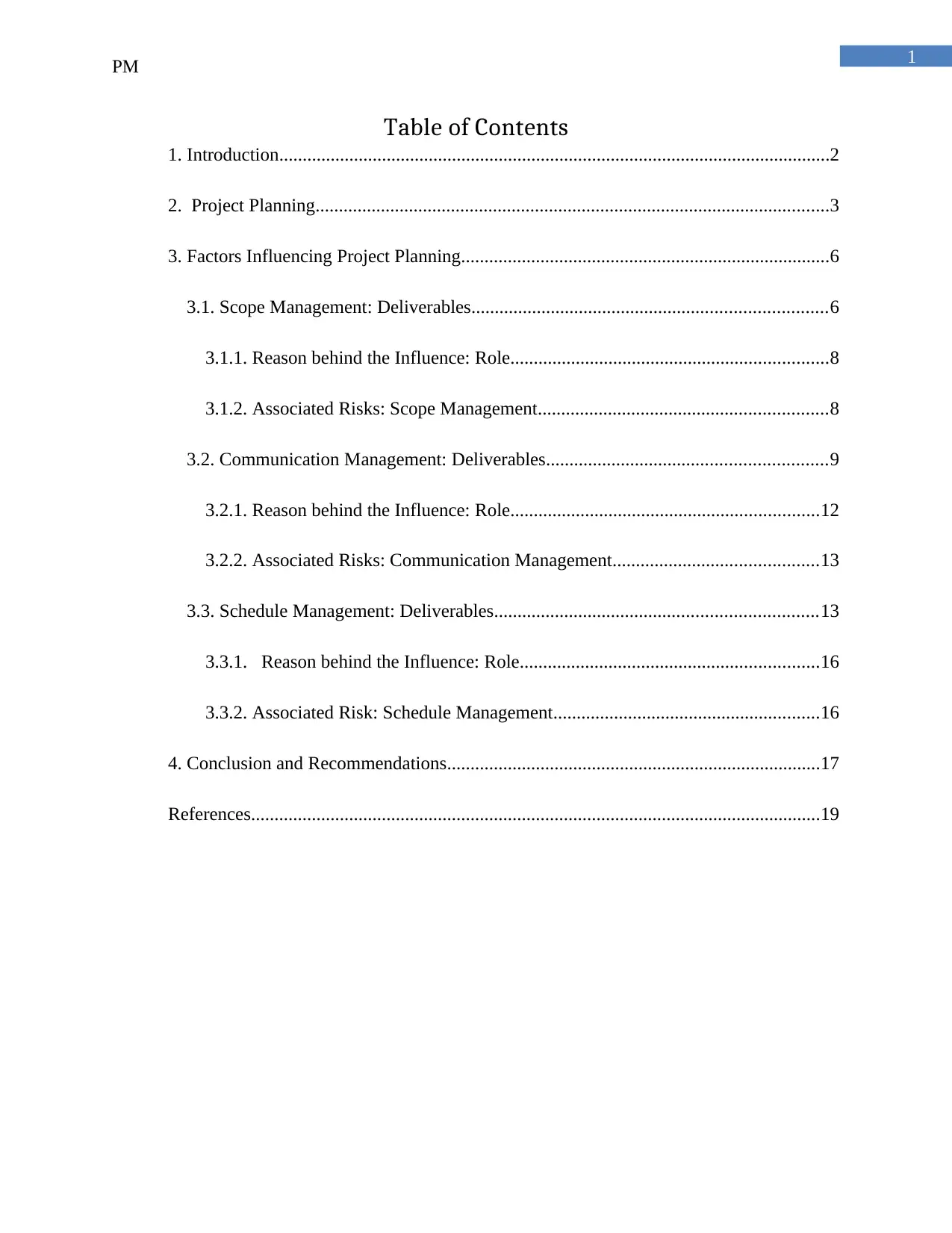
1
PM
Table of Contents
1. Introduction......................................................................................................................2
2. Project Planning..............................................................................................................3
3. Factors Influencing Project Planning...............................................................................6
3.1. Scope Management: Deliverables............................................................................6
3.1.1. Reason behind the Influence: Role....................................................................8
3.1.2. Associated Risks: Scope Management..............................................................8
3.2. Communication Management: Deliverables............................................................9
3.2.1. Reason behind the Influence: Role..................................................................12
3.2.2. Associated Risks: Communication Management............................................13
3.3. Schedule Management: Deliverables.....................................................................13
3.3.1. Reason behind the Influence: Role................................................................16
3.3.2. Associated Risk: Schedule Management.........................................................16
4. Conclusion and Recommendations................................................................................17
References..........................................................................................................................19
PM
Table of Contents
1. Introduction......................................................................................................................2
2. Project Planning..............................................................................................................3
3. Factors Influencing Project Planning...............................................................................6
3.1. Scope Management: Deliverables............................................................................6
3.1.1. Reason behind the Influence: Role....................................................................8
3.1.2. Associated Risks: Scope Management..............................................................8
3.2. Communication Management: Deliverables............................................................9
3.2.1. Reason behind the Influence: Role..................................................................12
3.2.2. Associated Risks: Communication Management............................................13
3.3. Schedule Management: Deliverables.....................................................................13
3.3.1. Reason behind the Influence: Role................................................................16
3.3.2. Associated Risk: Schedule Management.........................................................16
4. Conclusion and Recommendations................................................................................17
References..........................................................................................................................19
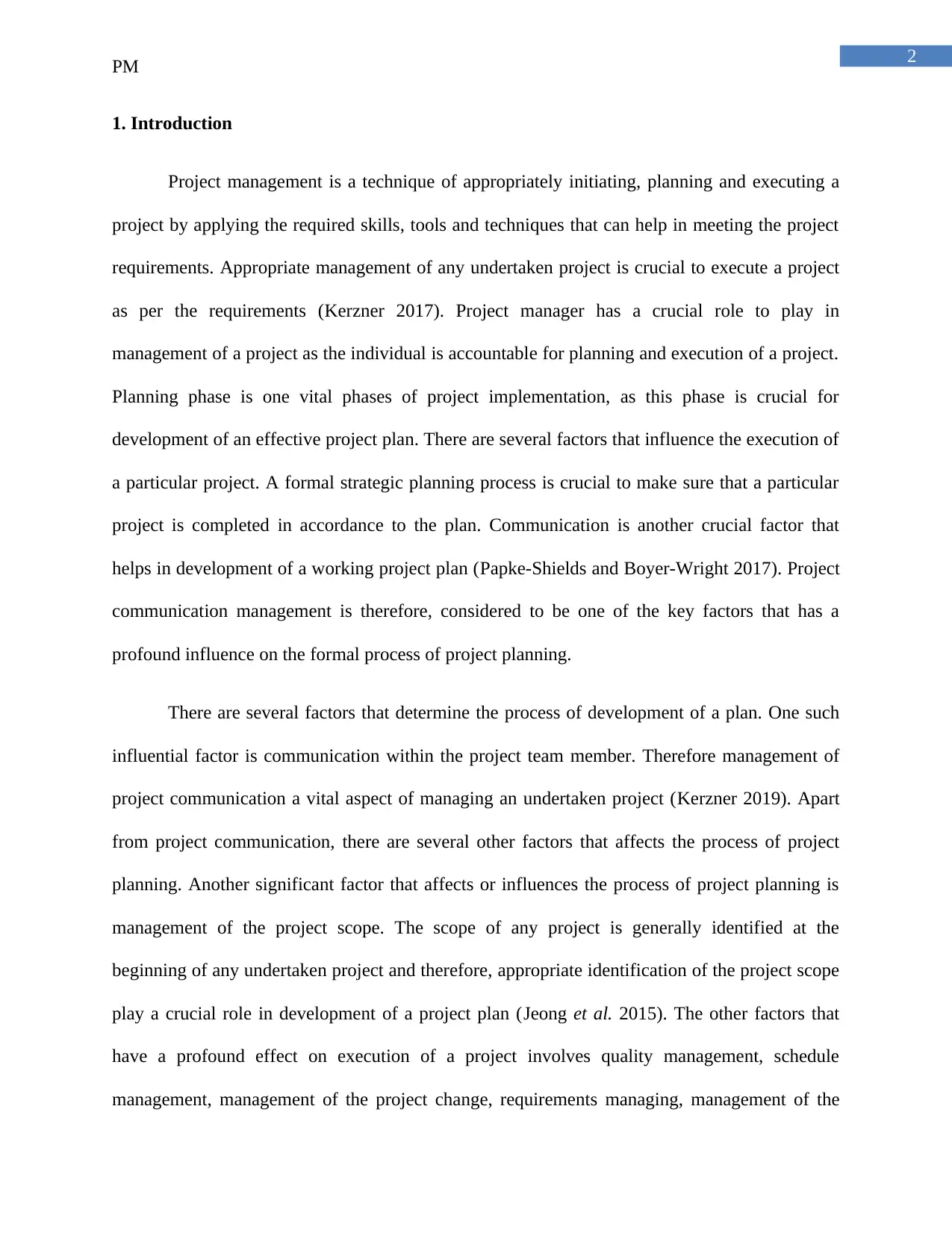
2
PM
1. Introduction
Project management is a technique of appropriately initiating, planning and executing a
project by applying the required skills, tools and techniques that can help in meeting the project
requirements. Appropriate management of any undertaken project is crucial to execute a project
as per the requirements (Kerzner 2017). Project manager has a crucial role to play in
management of a project as the individual is accountable for planning and execution of a project.
Planning phase is one vital phases of project implementation, as this phase is crucial for
development of an effective project plan. There are several factors that influence the execution of
a particular project. A formal strategic planning process is crucial to make sure that a particular
project is completed in accordance to the plan. Communication is another crucial factor that
helps in development of a working project plan (Papke-Shields and Boyer-Wright 2017). Project
communication management is therefore, considered to be one of the key factors that has a
profound influence on the formal process of project planning.
There are several factors that determine the process of development of a plan. One such
influential factor is communication within the project team member. Therefore management of
project communication a vital aspect of managing an undertaken project (Kerzner 2019). Apart
from project communication, there are several other factors that affects the process of project
planning. Another significant factor that affects or influences the process of project planning is
management of the project scope. The scope of any project is generally identified at the
beginning of any undertaken project and therefore, appropriate identification of the project scope
play a crucial role in development of a project plan (Jeong et al. 2015). The other factors that
have a profound effect on execution of a project involves quality management, schedule
management, management of the project change, requirements managing, management of the
PM
1. Introduction
Project management is a technique of appropriately initiating, planning and executing a
project by applying the required skills, tools and techniques that can help in meeting the project
requirements. Appropriate management of any undertaken project is crucial to execute a project
as per the requirements (Kerzner 2017). Project manager has a crucial role to play in
management of a project as the individual is accountable for planning and execution of a project.
Planning phase is one vital phases of project implementation, as this phase is crucial for
development of an effective project plan. There are several factors that influence the execution of
a particular project. A formal strategic planning process is crucial to make sure that a particular
project is completed in accordance to the plan. Communication is another crucial factor that
helps in development of a working project plan (Papke-Shields and Boyer-Wright 2017). Project
communication management is therefore, considered to be one of the key factors that has a
profound influence on the formal process of project planning.
There are several factors that determine the process of development of a plan. One such
influential factor is communication within the project team member. Therefore management of
project communication a vital aspect of managing an undertaken project (Kerzner 2019). Apart
from project communication, there are several other factors that affects the process of project
planning. Another significant factor that affects or influences the process of project planning is
management of the project scope. The scope of any project is generally identified at the
beginning of any undertaken project and therefore, appropriate identification of the project scope
play a crucial role in development of a project plan (Jeong et al. 2015). The other factors that
have a profound effect on execution of a project involves quality management, schedule
management, management of the project change, requirements managing, management of the
⊘ This is a preview!⊘
Do you want full access?
Subscribe today to unlock all pages.

Trusted by 1+ million students worldwide
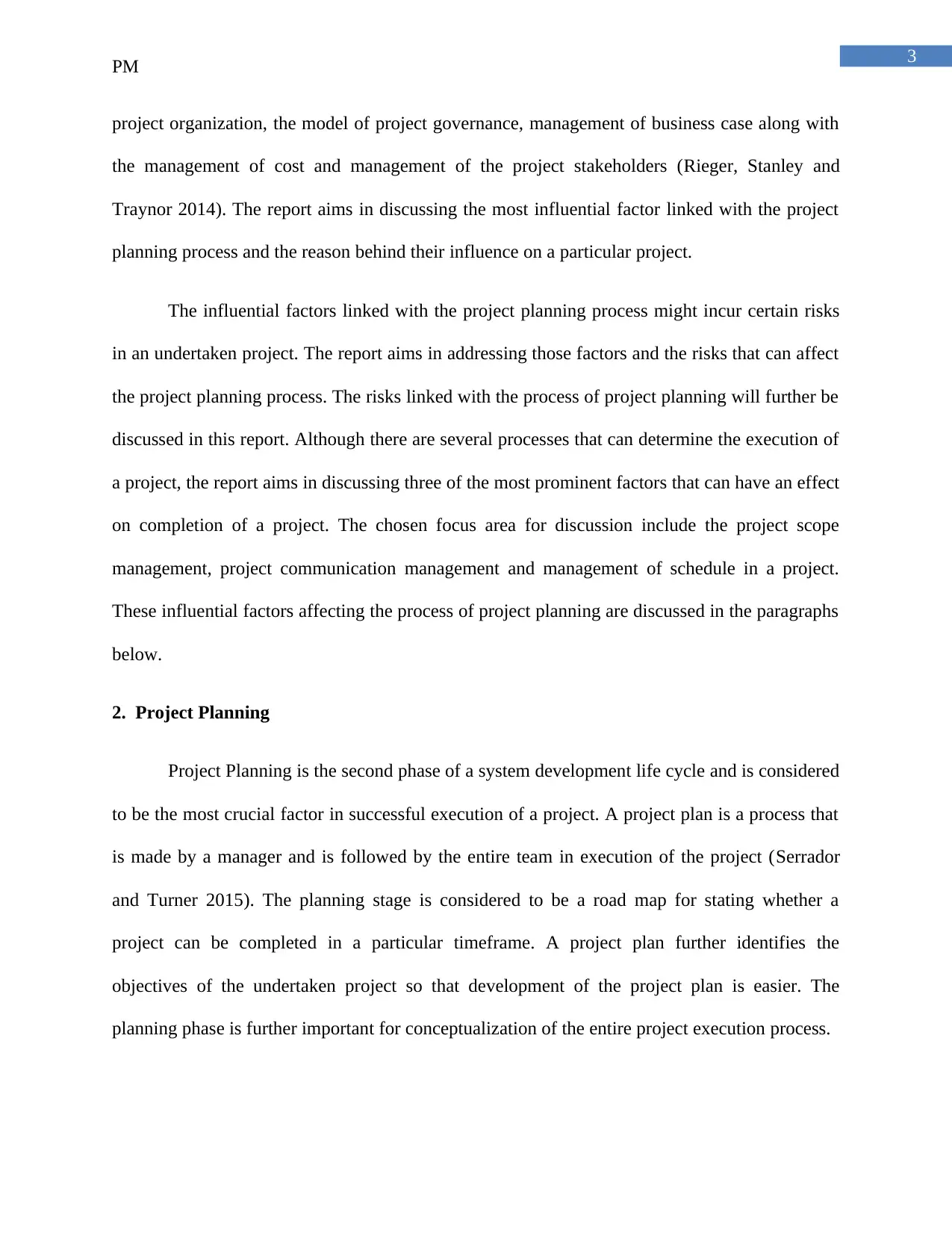
3
PM
project organization, the model of project governance, management of business case along with
the management of cost and management of the project stakeholders (Rieger, Stanley and
Traynor 2014). The report aims in discussing the most influential factor linked with the project
planning process and the reason behind their influence on a particular project.
The influential factors linked with the project planning process might incur certain risks
in an undertaken project. The report aims in addressing those factors and the risks that can affect
the project planning process. The risks linked with the process of project planning will further be
discussed in this report. Although there are several processes that can determine the execution of
a project, the report aims in discussing three of the most prominent factors that can have an effect
on completion of a project. The chosen focus area for discussion include the project scope
management, project communication management and management of schedule in a project.
These influential factors affecting the process of project planning are discussed in the paragraphs
below.
2. Project Planning
Project Planning is the second phase of a system development life cycle and is considered
to be the most crucial factor in successful execution of a project. A project plan is a process that
is made by a manager and is followed by the entire team in execution of the project (Serrador
and Turner 2015). The planning stage is considered to be a road map for stating whether a
project can be completed in a particular timeframe. A project plan further identifies the
objectives of the undertaken project so that development of the project plan is easier. The
planning phase is further important for conceptualization of the entire project execution process.
PM
project organization, the model of project governance, management of business case along with
the management of cost and management of the project stakeholders (Rieger, Stanley and
Traynor 2014). The report aims in discussing the most influential factor linked with the project
planning process and the reason behind their influence on a particular project.
The influential factors linked with the project planning process might incur certain risks
in an undertaken project. The report aims in addressing those factors and the risks that can affect
the project planning process. The risks linked with the process of project planning will further be
discussed in this report. Although there are several processes that can determine the execution of
a project, the report aims in discussing three of the most prominent factors that can have an effect
on completion of a project. The chosen focus area for discussion include the project scope
management, project communication management and management of schedule in a project.
These influential factors affecting the process of project planning are discussed in the paragraphs
below.
2. Project Planning
Project Planning is the second phase of a system development life cycle and is considered
to be the most crucial factor in successful execution of a project. A project plan is a process that
is made by a manager and is followed by the entire team in execution of the project (Serrador
and Turner 2015). The planning stage is considered to be a road map for stating whether a
project can be completed in a particular timeframe. A project plan further identifies the
objectives of the undertaken project so that development of the project plan is easier. The
planning phase is further important for conceptualization of the entire project execution process.
Paraphrase This Document
Need a fresh take? Get an instant paraphrase of this document with our AI Paraphraser
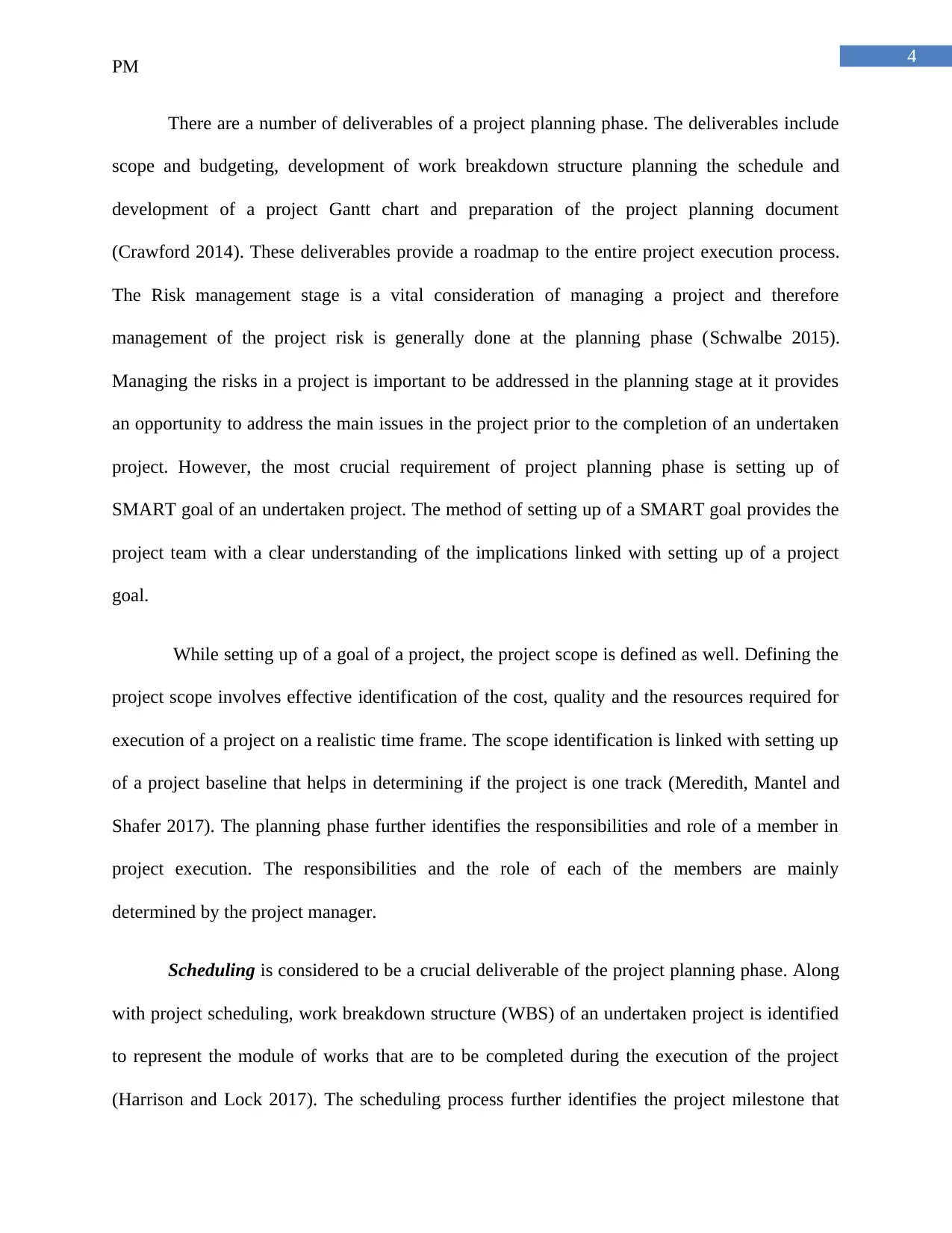
4
PM
There are a number of deliverables of a project planning phase. The deliverables include
scope and budgeting, development of work breakdown structure planning the schedule and
development of a project Gantt chart and preparation of the project planning document
(Crawford 2014). These deliverables provide a roadmap to the entire project execution process.
The Risk management stage is a vital consideration of managing a project and therefore
management of the project risk is generally done at the planning phase (Schwalbe 2015).
Managing the risks in a project is important to be addressed in the planning stage at it provides
an opportunity to address the main issues in the project prior to the completion of an undertaken
project. However, the most crucial requirement of project planning phase is setting up of
SMART goal of an undertaken project. The method of setting up of a SMART goal provides the
project team with a clear understanding of the implications linked with setting up of a project
goal.
While setting up of a goal of a project, the project scope is defined as well. Defining the
project scope involves effective identification of the cost, quality and the resources required for
execution of a project on a realistic time frame. The scope identification is linked with setting up
of a project baseline that helps in determining if the project is one track (Meredith, Mantel and
Shafer 2017). The planning phase further identifies the responsibilities and role of a member in
project execution. The responsibilities and the role of each of the members are mainly
determined by the project manager.
Scheduling is considered to be a crucial deliverable of the project planning phase. Along
with project scheduling, work breakdown structure (WBS) of an undertaken project is identified
to represent the module of works that are to be completed during the execution of the project
(Harrison and Lock 2017). The scheduling process further identifies the project milestone that
PM
There are a number of deliverables of a project planning phase. The deliverables include
scope and budgeting, development of work breakdown structure planning the schedule and
development of a project Gantt chart and preparation of the project planning document
(Crawford 2014). These deliverables provide a roadmap to the entire project execution process.
The Risk management stage is a vital consideration of managing a project and therefore
management of the project risk is generally done at the planning phase (Schwalbe 2015).
Managing the risks in a project is important to be addressed in the planning stage at it provides
an opportunity to address the main issues in the project prior to the completion of an undertaken
project. However, the most crucial requirement of project planning phase is setting up of
SMART goal of an undertaken project. The method of setting up of a SMART goal provides the
project team with a clear understanding of the implications linked with setting up of a project
goal.
While setting up of a goal of a project, the project scope is defined as well. Defining the
project scope involves effective identification of the cost, quality and the resources required for
execution of a project on a realistic time frame. The scope identification is linked with setting up
of a project baseline that helps in determining if the project is one track (Meredith, Mantel and
Shafer 2017). The planning phase further identifies the responsibilities and role of a member in
project execution. The responsibilities and the role of each of the members are mainly
determined by the project manager.
Scheduling is considered to be a crucial deliverable of the project planning phase. Along
with project scheduling, work breakdown structure (WBS) of an undertaken project is identified
to represent the module of works that are to be completed during the execution of the project
(Harrison and Lock 2017). The scheduling process further identifies the project milestone that
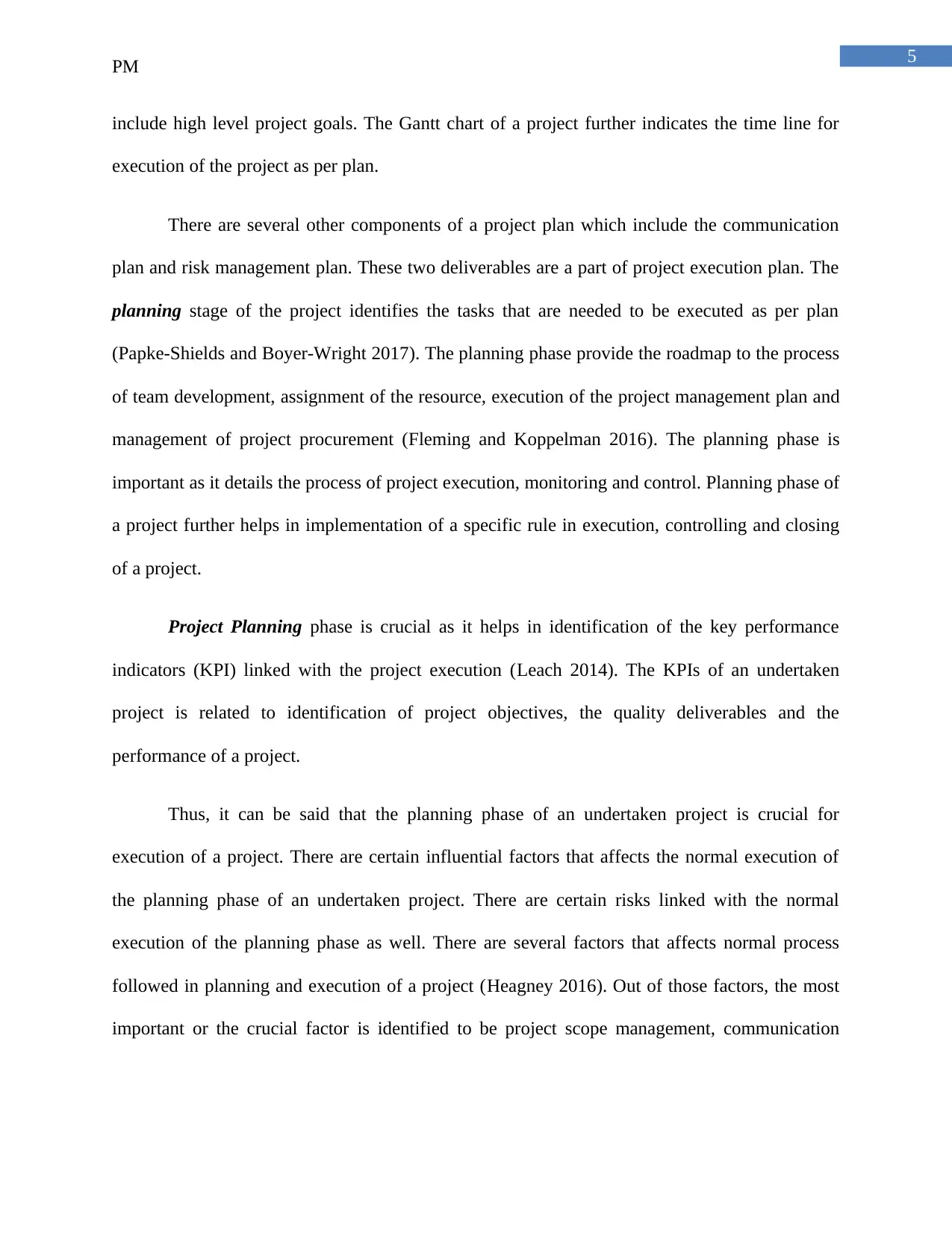
5
PM
include high level project goals. The Gantt chart of a project further indicates the time line for
execution of the project as per plan.
There are several other components of a project plan which include the communication
plan and risk management plan. These two deliverables are a part of project execution plan. The
planning stage of the project identifies the tasks that are needed to be executed as per plan
(Papke-Shields and Boyer-Wright 2017). The planning phase provide the roadmap to the process
of team development, assignment of the resource, execution of the project management plan and
management of project procurement (Fleming and Koppelman 2016). The planning phase is
important as it details the process of project execution, monitoring and control. Planning phase of
a project further helps in implementation of a specific rule in execution, controlling and closing
of a project.
Project Planning phase is crucial as it helps in identification of the key performance
indicators (KPI) linked with the project execution (Leach 2014). The KPIs of an undertaken
project is related to identification of project objectives, the quality deliverables and the
performance of a project.
Thus, it can be said that the planning phase of an undertaken project is crucial for
execution of a project. There are certain influential factors that affects the normal execution of
the planning phase of an undertaken project. There are certain risks linked with the normal
execution of the planning phase as well. There are several factors that affects normal process
followed in planning and execution of a project (Heagney 2016). Out of those factors, the most
important or the crucial factor is identified to be project scope management, communication
PM
include high level project goals. The Gantt chart of a project further indicates the time line for
execution of the project as per plan.
There are several other components of a project plan which include the communication
plan and risk management plan. These two deliverables are a part of project execution plan. The
planning stage of the project identifies the tasks that are needed to be executed as per plan
(Papke-Shields and Boyer-Wright 2017). The planning phase provide the roadmap to the process
of team development, assignment of the resource, execution of the project management plan and
management of project procurement (Fleming and Koppelman 2016). The planning phase is
important as it details the process of project execution, monitoring and control. Planning phase of
a project further helps in implementation of a specific rule in execution, controlling and closing
of a project.
Project Planning phase is crucial as it helps in identification of the key performance
indicators (KPI) linked with the project execution (Leach 2014). The KPIs of an undertaken
project is related to identification of project objectives, the quality deliverables and the
performance of a project.
Thus, it can be said that the planning phase of an undertaken project is crucial for
execution of a project. There are certain influential factors that affects the normal execution of
the planning phase of an undertaken project. There are certain risks linked with the normal
execution of the planning phase as well. There are several factors that affects normal process
followed in planning and execution of a project (Heagney 2016). Out of those factors, the most
important or the crucial factor is identified to be project scope management, communication
⊘ This is a preview!⊘
Do you want full access?
Subscribe today to unlock all pages.

Trusted by 1+ million students worldwide
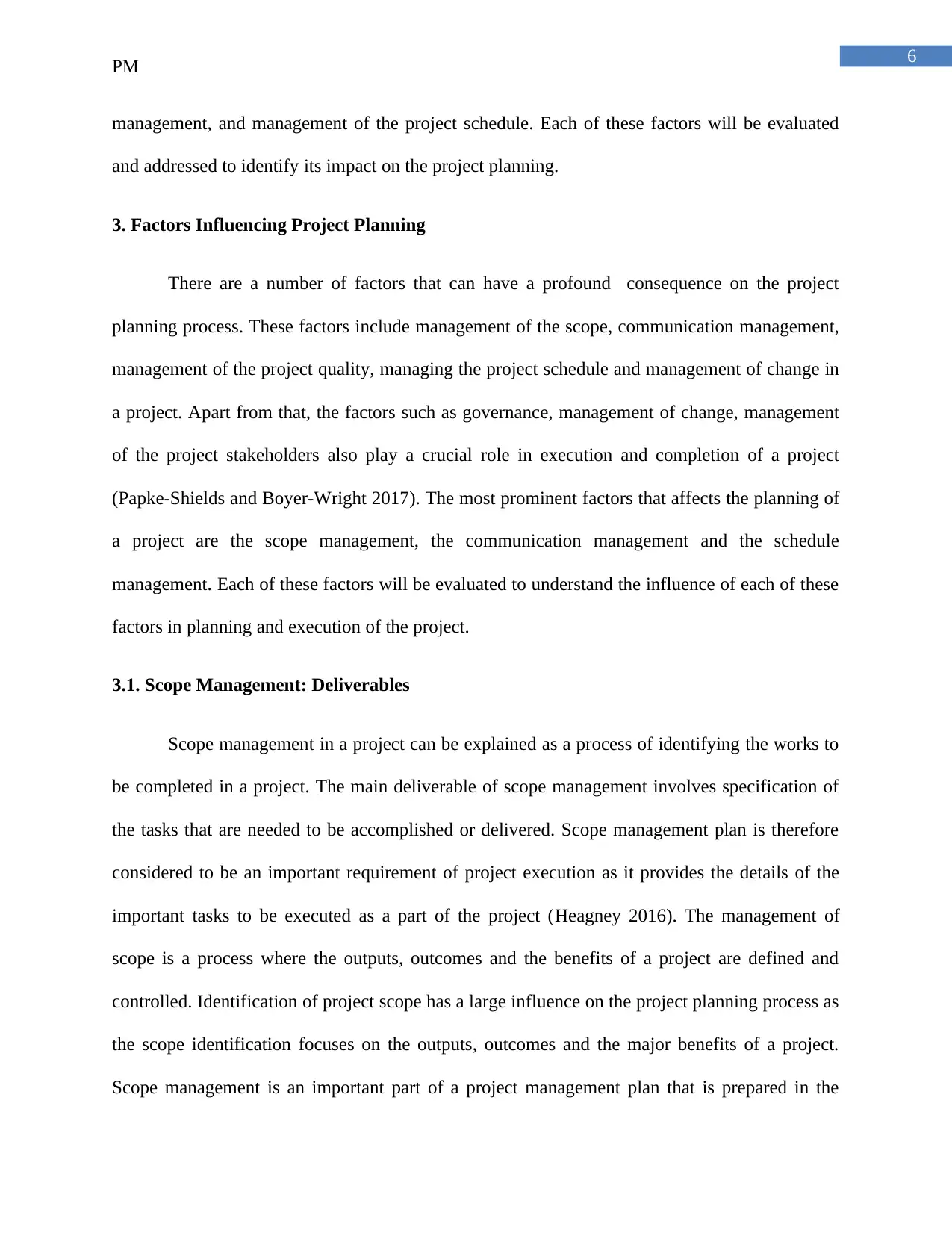
6
PM
management, and management of the project schedule. Each of these factors will be evaluated
and addressed to identify its impact on the project planning.
3. Factors Influencing Project Planning
There are a number of factors that can have a profound consequence on the project
planning process. These factors include management of the scope, communication management,
management of the project quality, managing the project schedule and management of change in
a project. Apart from that, the factors such as governance, management of change, management
of the project stakeholders also play a crucial role in execution and completion of a project
(Papke-Shields and Boyer-Wright 2017). The most prominent factors that affects the planning of
a project are the scope management, the communication management and the schedule
management. Each of these factors will be evaluated to understand the influence of each of these
factors in planning and execution of the project.
3.1. Scope Management: Deliverables
Scope management in a project can be explained as a process of identifying the works to
be completed in a project. The main deliverable of scope management involves specification of
the tasks that are needed to be accomplished or delivered. Scope management plan is therefore
considered to be an important requirement of project execution as it provides the details of the
important tasks to be executed as a part of the project (Heagney 2016). The management of
scope is a process where the outputs, outcomes and the benefits of a project are defined and
controlled. Identification of project scope has a large influence on the project planning process as
the scope identification focuses on the outputs, outcomes and the major benefits of a project.
Scope management is an important part of a project management plan that is prepared in the
PM
management, and management of the project schedule. Each of these factors will be evaluated
and addressed to identify its impact on the project planning.
3. Factors Influencing Project Planning
There are a number of factors that can have a profound consequence on the project
planning process. These factors include management of the scope, communication management,
management of the project quality, managing the project schedule and management of change in
a project. Apart from that, the factors such as governance, management of change, management
of the project stakeholders also play a crucial role in execution and completion of a project
(Papke-Shields and Boyer-Wright 2017). The most prominent factors that affects the planning of
a project are the scope management, the communication management and the schedule
management. Each of these factors will be evaluated to understand the influence of each of these
factors in planning and execution of the project.
3.1. Scope Management: Deliverables
Scope management in a project can be explained as a process of identifying the works to
be completed in a project. The main deliverable of scope management involves specification of
the tasks that are needed to be accomplished or delivered. Scope management plan is therefore
considered to be an important requirement of project execution as it provides the details of the
important tasks to be executed as a part of the project (Heagney 2016). The management of
scope is a process where the outputs, outcomes and the benefits of a project are defined and
controlled. Identification of project scope has a large influence on the project planning process as
the scope identification focuses on the outputs, outcomes and the major benefits of a project.
Scope management is an important part of a project management plan that is prepared in the
Paraphrase This Document
Need a fresh take? Get an instant paraphrase of this document with our AI Paraphraser
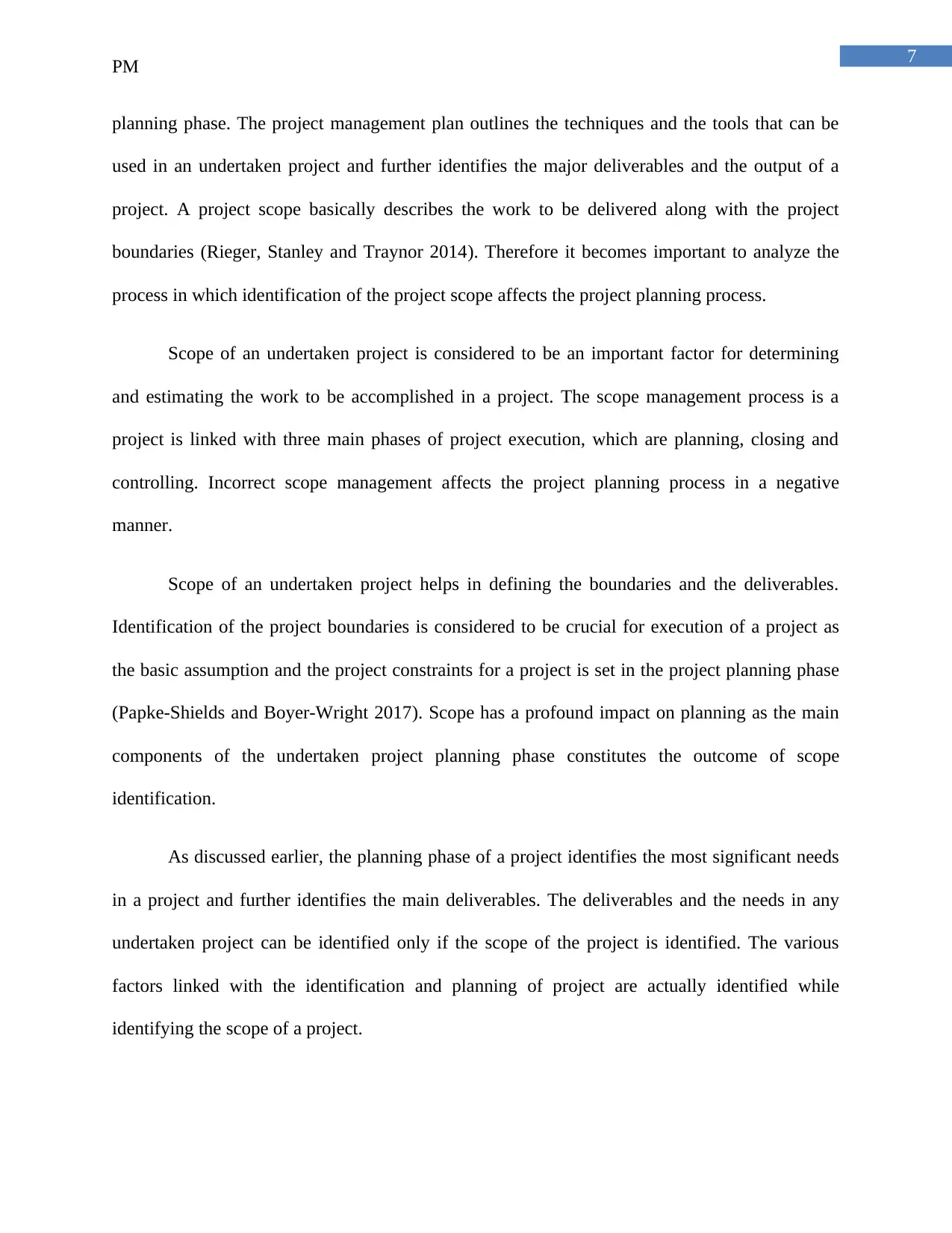
7
PM
planning phase. The project management plan outlines the techniques and the tools that can be
used in an undertaken project and further identifies the major deliverables and the output of a
project. A project scope basically describes the work to be delivered along with the project
boundaries (Rieger, Stanley and Traynor 2014). Therefore it becomes important to analyze the
process in which identification of the project scope affects the project planning process.
Scope of an undertaken project is considered to be an important factor for determining
and estimating the work to be accomplished in a project. The scope management process is a
project is linked with three main phases of project execution, which are planning, closing and
controlling. Incorrect scope management affects the project planning process in a negative
manner.
Scope of an undertaken project helps in defining the boundaries and the deliverables.
Identification of the project boundaries is considered to be crucial for execution of a project as
the basic assumption and the project constraints for a project is set in the project planning phase
(Papke-Shields and Boyer-Wright 2017). Scope has a profound impact on planning as the main
components of the undertaken project planning phase constitutes the outcome of scope
identification.
As discussed earlier, the planning phase of a project identifies the most significant needs
in a project and further identifies the main deliverables. The deliverables and the needs in any
undertaken project can be identified only if the scope of the project is identified. The various
factors linked with the identification and planning of project are actually identified while
identifying the scope of a project.
PM
planning phase. The project management plan outlines the techniques and the tools that can be
used in an undertaken project and further identifies the major deliverables and the output of a
project. A project scope basically describes the work to be delivered along with the project
boundaries (Rieger, Stanley and Traynor 2014). Therefore it becomes important to analyze the
process in which identification of the project scope affects the project planning process.
Scope of an undertaken project is considered to be an important factor for determining
and estimating the work to be accomplished in a project. The scope management process is a
project is linked with three main phases of project execution, which are planning, closing and
controlling. Incorrect scope management affects the project planning process in a negative
manner.
Scope of an undertaken project helps in defining the boundaries and the deliverables.
Identification of the project boundaries is considered to be crucial for execution of a project as
the basic assumption and the project constraints for a project is set in the project planning phase
(Papke-Shields and Boyer-Wright 2017). Scope has a profound impact on planning as the main
components of the undertaken project planning phase constitutes the outcome of scope
identification.
As discussed earlier, the planning phase of a project identifies the most significant needs
in a project and further identifies the main deliverables. The deliverables and the needs in any
undertaken project can be identified only if the scope of the project is identified. The various
factors linked with the identification and planning of project are actually identified while
identifying the scope of a project.
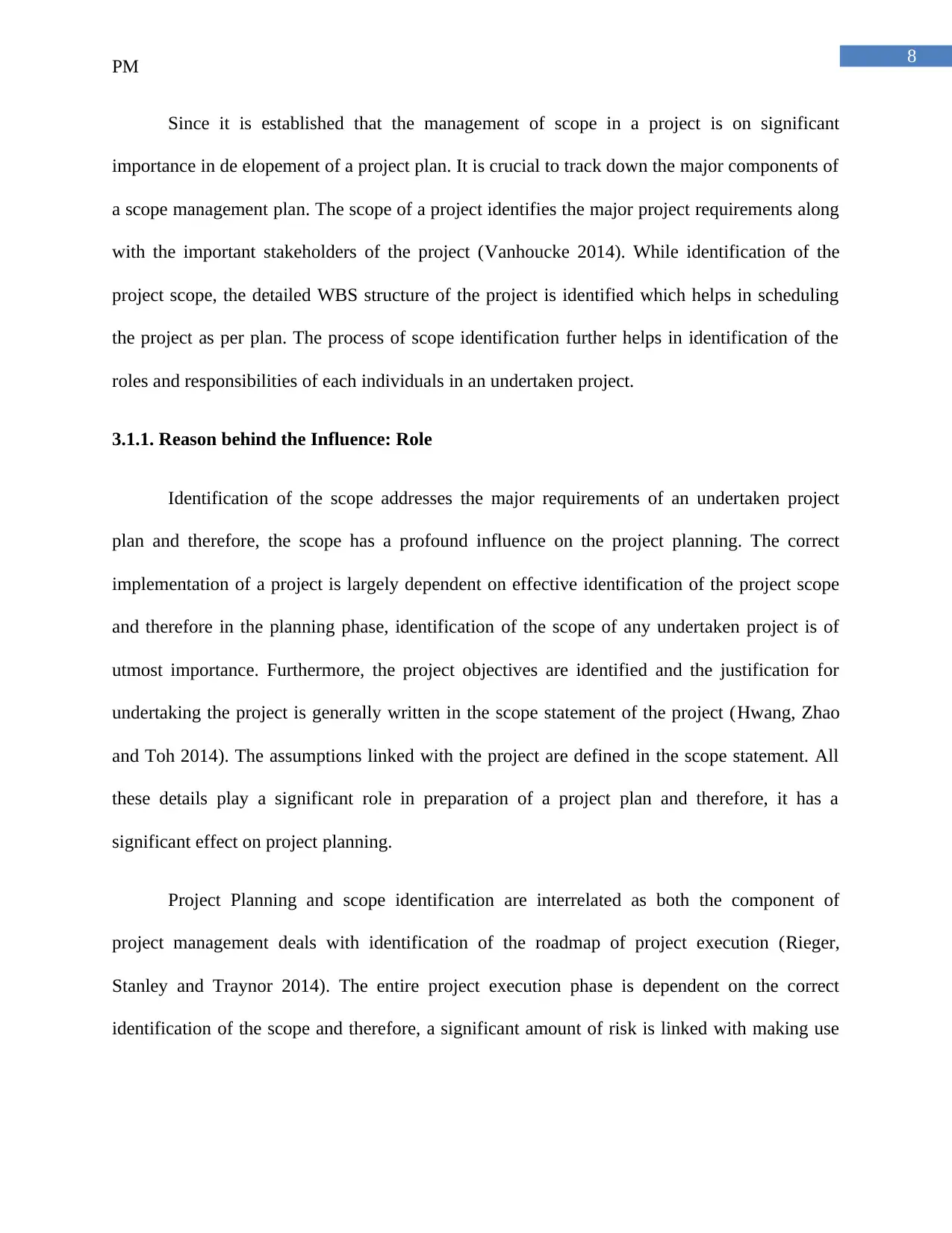
8
PM
Since it is established that the management of scope in a project is on significant
importance in de elopement of a project plan. It is crucial to track down the major components of
a scope management plan. The scope of a project identifies the major project requirements along
with the important stakeholders of the project (Vanhoucke 2014). While identification of the
project scope, the detailed WBS structure of the project is identified which helps in scheduling
the project as per plan. The process of scope identification further helps in identification of the
roles and responsibilities of each individuals in an undertaken project.
3.1.1. Reason behind the Influence: Role
Identification of the scope addresses the major requirements of an undertaken project
plan and therefore, the scope has a profound influence on the project planning. The correct
implementation of a project is largely dependent on effective identification of the project scope
and therefore in the planning phase, identification of the scope of any undertaken project is of
utmost importance. Furthermore, the project objectives are identified and the justification for
undertaking the project is generally written in the scope statement of the project (Hwang, Zhao
and Toh 2014). The assumptions linked with the project are defined in the scope statement. All
these details play a significant role in preparation of a project plan and therefore, it has a
significant effect on project planning.
Project Planning and scope identification are interrelated as both the component of
project management deals with identification of the roadmap of project execution (Rieger,
Stanley and Traynor 2014). The entire project execution phase is dependent on the correct
identification of the scope and therefore, a significant amount of risk is linked with making use
PM
Since it is established that the management of scope in a project is on significant
importance in de elopement of a project plan. It is crucial to track down the major components of
a scope management plan. The scope of a project identifies the major project requirements along
with the important stakeholders of the project (Vanhoucke 2014). While identification of the
project scope, the detailed WBS structure of the project is identified which helps in scheduling
the project as per plan. The process of scope identification further helps in identification of the
roles and responsibilities of each individuals in an undertaken project.
3.1.1. Reason behind the Influence: Role
Identification of the scope addresses the major requirements of an undertaken project
plan and therefore, the scope has a profound influence on the project planning. The correct
implementation of a project is largely dependent on effective identification of the project scope
and therefore in the planning phase, identification of the scope of any undertaken project is of
utmost importance. Furthermore, the project objectives are identified and the justification for
undertaking the project is generally written in the scope statement of the project (Hwang, Zhao
and Toh 2014). The assumptions linked with the project are defined in the scope statement. All
these details play a significant role in preparation of a project plan and therefore, it has a
significant effect on project planning.
Project Planning and scope identification are interrelated as both the component of
project management deals with identification of the roadmap of project execution (Rieger,
Stanley and Traynor 2014). The entire project execution phase is dependent on the correct
identification of the scope and therefore, a significant amount of risk is linked with making use
⊘ This is a preview!⊘
Do you want full access?
Subscribe today to unlock all pages.

Trusted by 1+ million students worldwide
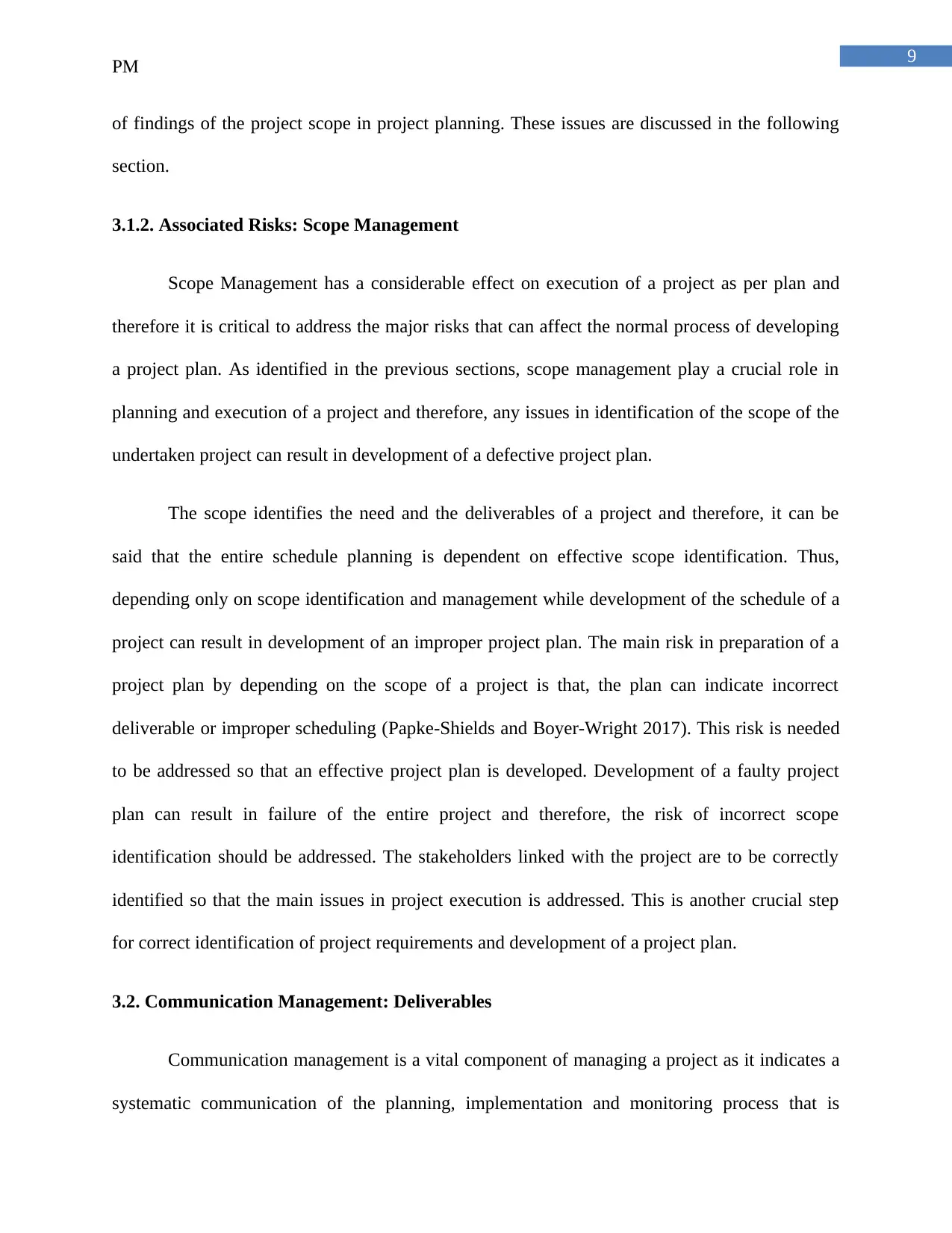
9
PM
of findings of the project scope in project planning. These issues are discussed in the following
section.
3.1.2. Associated Risks: Scope Management
Scope Management has a considerable effect on execution of a project as per plan and
therefore it is critical to address the major risks that can affect the normal process of developing
a project plan. As identified in the previous sections, scope management play a crucial role in
planning and execution of a project and therefore, any issues in identification of the scope of the
undertaken project can result in development of a defective project plan.
The scope identifies the need and the deliverables of a project and therefore, it can be
said that the entire schedule planning is dependent on effective scope identification. Thus,
depending only on scope identification and management while development of the schedule of a
project can result in development of an improper project plan. The main risk in preparation of a
project plan by depending on the scope of a project is that, the plan can indicate incorrect
deliverable or improper scheduling (Papke-Shields and Boyer-Wright 2017). This risk is needed
to be addressed so that an effective project plan is developed. Development of a faulty project
plan can result in failure of the entire project and therefore, the risk of incorrect scope
identification should be addressed. The stakeholders linked with the project are to be correctly
identified so that the main issues in project execution is addressed. This is another crucial step
for correct identification of project requirements and development of a project plan.
3.2. Communication Management: Deliverables
Communication management is a vital component of managing a project as it indicates a
systematic communication of the planning, implementation and monitoring process that is
PM
of findings of the project scope in project planning. These issues are discussed in the following
section.
3.1.2. Associated Risks: Scope Management
Scope Management has a considerable effect on execution of a project as per plan and
therefore it is critical to address the major risks that can affect the normal process of developing
a project plan. As identified in the previous sections, scope management play a crucial role in
planning and execution of a project and therefore, any issues in identification of the scope of the
undertaken project can result in development of a defective project plan.
The scope identifies the need and the deliverables of a project and therefore, it can be
said that the entire schedule planning is dependent on effective scope identification. Thus,
depending only on scope identification and management while development of the schedule of a
project can result in development of an improper project plan. The main risk in preparation of a
project plan by depending on the scope of a project is that, the plan can indicate incorrect
deliverable or improper scheduling (Papke-Shields and Boyer-Wright 2017). This risk is needed
to be addressed so that an effective project plan is developed. Development of a faulty project
plan can result in failure of the entire project and therefore, the risk of incorrect scope
identification should be addressed. The stakeholders linked with the project are to be correctly
identified so that the main issues in project execution is addressed. This is another crucial step
for correct identification of project requirements and development of a project plan.
3.2. Communication Management: Deliverables
Communication management is a vital component of managing a project as it indicates a
systematic communication of the planning, implementation and monitoring process that is
Paraphrase This Document
Need a fresh take? Get an instant paraphrase of this document with our AI Paraphraser
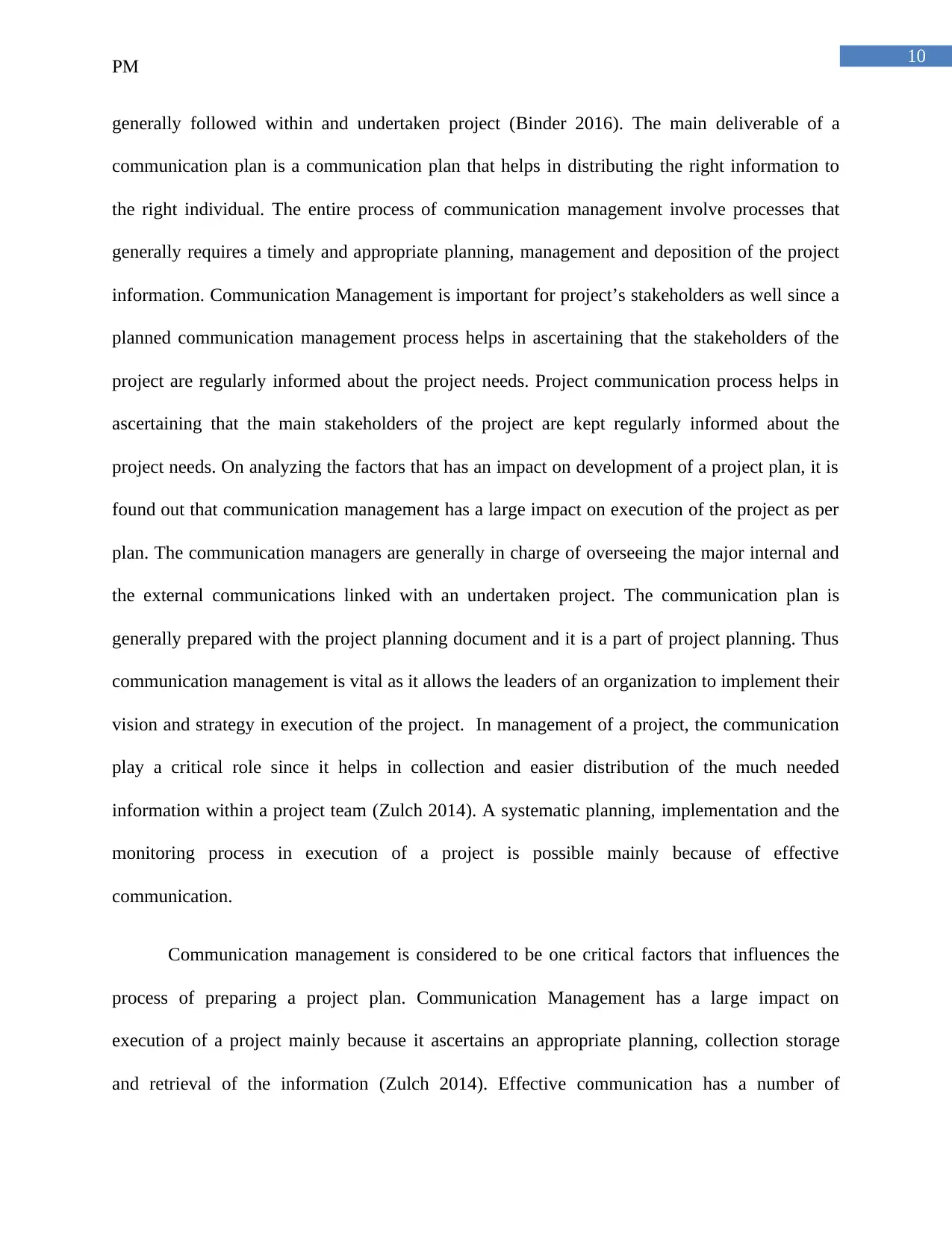
10
PM
generally followed within and undertaken project (Binder 2016). The main deliverable of a
communication plan is a communication plan that helps in distributing the right information to
the right individual. The entire process of communication management involve processes that
generally requires a timely and appropriate planning, management and deposition of the project
information. Communication Management is important for project’s stakeholders as well since a
planned communication management process helps in ascertaining that the stakeholders of the
project are regularly informed about the project needs. Project communication process helps in
ascertaining that the main stakeholders of the project are kept regularly informed about the
project needs. On analyzing the factors that has an impact on development of a project plan, it is
found out that communication management has a large impact on execution of the project as per
plan. The communication managers are generally in charge of overseeing the major internal and
the external communications linked with an undertaken project. The communication plan is
generally prepared with the project planning document and it is a part of project planning. Thus
communication management is vital as it allows the leaders of an organization to implement their
vision and strategy in execution of the project. In management of a project, the communication
play a critical role since it helps in collection and easier distribution of the much needed
information within a project team (Zulch 2014). A systematic planning, implementation and the
monitoring process in execution of a project is possible mainly because of effective
communication.
Communication management is considered to be one critical factors that influences the
process of preparing a project plan. Communication Management has a large impact on
execution of a project mainly because it ascertains an appropriate planning, collection storage
and retrieval of the information (Zulch 2014). Effective communication has a number of
PM
generally followed within and undertaken project (Binder 2016). The main deliverable of a
communication plan is a communication plan that helps in distributing the right information to
the right individual. The entire process of communication management involve processes that
generally requires a timely and appropriate planning, management and deposition of the project
information. Communication Management is important for project’s stakeholders as well since a
planned communication management process helps in ascertaining that the stakeholders of the
project are regularly informed about the project needs. Project communication process helps in
ascertaining that the main stakeholders of the project are kept regularly informed about the
project needs. On analyzing the factors that has an impact on development of a project plan, it is
found out that communication management has a large impact on execution of the project as per
plan. The communication managers are generally in charge of overseeing the major internal and
the external communications linked with an undertaken project. The communication plan is
generally prepared with the project planning document and it is a part of project planning. Thus
communication management is vital as it allows the leaders of an organization to implement their
vision and strategy in execution of the project. In management of a project, the communication
play a critical role since it helps in collection and easier distribution of the much needed
information within a project team (Zulch 2014). A systematic planning, implementation and the
monitoring process in execution of a project is possible mainly because of effective
communication.
Communication management is considered to be one critical factors that influences the
process of preparing a project plan. Communication Management has a large impact on
execution of a project mainly because it ascertains an appropriate planning, collection storage
and retrieval of the information (Zulch 2014). Effective communication has a number of
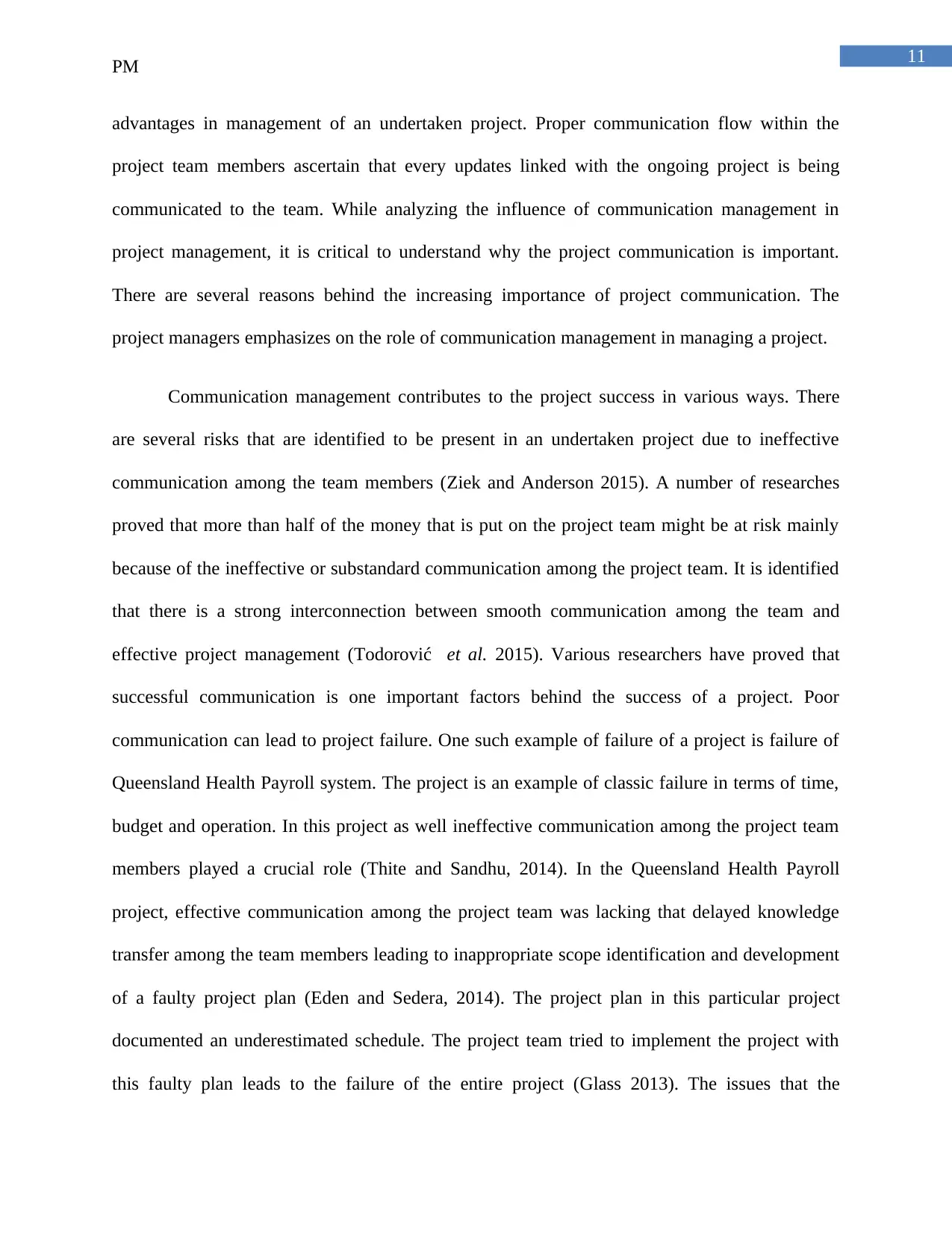
11
PM
advantages in management of an undertaken project. Proper communication flow within the
project team members ascertain that every updates linked with the ongoing project is being
communicated to the team. While analyzing the influence of communication management in
project management, it is critical to understand why the project communication is important.
There are several reasons behind the increasing importance of project communication. The
project managers emphasizes on the role of communication management in managing a project.
Communication management contributes to the project success in various ways. There
are several risks that are identified to be present in an undertaken project due to ineffective
communication among the team members (Ziek and Anderson 2015). A number of researches
proved that more than half of the money that is put on the project team might be at risk mainly
because of the ineffective or substandard communication among the project team. It is identified
that there is a strong interconnection between smooth communication among the team and
effective project management (Todorović et al. 2015). Various researchers have proved that
successful communication is one important factors behind the success of a project. Poor
communication can lead to project failure. One such example of failure of a project is failure of
Queensland Health Payroll system. The project is an example of classic failure in terms of time,
budget and operation. In this project as well ineffective communication among the project team
members played a crucial role (Thite and Sandhu, 2014). In the Queensland Health Payroll
project, effective communication among the project team was lacking that delayed knowledge
transfer among the team members leading to inappropriate scope identification and development
of a faulty project plan (Eden and Sedera, 2014). The project plan in this particular project
documented an underestimated schedule. The project team tried to implement the project with
this faulty plan leads to the failure of the entire project (Glass 2013). The issues that the
PM
advantages in management of an undertaken project. Proper communication flow within the
project team members ascertain that every updates linked with the ongoing project is being
communicated to the team. While analyzing the influence of communication management in
project management, it is critical to understand why the project communication is important.
There are several reasons behind the increasing importance of project communication. The
project managers emphasizes on the role of communication management in managing a project.
Communication management contributes to the project success in various ways. There
are several risks that are identified to be present in an undertaken project due to ineffective
communication among the team members (Ziek and Anderson 2015). A number of researches
proved that more than half of the money that is put on the project team might be at risk mainly
because of the ineffective or substandard communication among the project team. It is identified
that there is a strong interconnection between smooth communication among the team and
effective project management (Todorović et al. 2015). Various researchers have proved that
successful communication is one important factors behind the success of a project. Poor
communication can lead to project failure. One such example of failure of a project is failure of
Queensland Health Payroll system. The project is an example of classic failure in terms of time,
budget and operation. In this project as well ineffective communication among the project team
members played a crucial role (Thite and Sandhu, 2014). In the Queensland Health Payroll
project, effective communication among the project team was lacking that delayed knowledge
transfer among the team members leading to inappropriate scope identification and development
of a faulty project plan (Eden and Sedera, 2014). The project plan in this particular project
documented an underestimated schedule. The project team tried to implement the project with
this faulty plan leads to the failure of the entire project (Glass 2013). The issues that the
⊘ This is a preview!⊘
Do you want full access?
Subscribe today to unlock all pages.

Trusted by 1+ million students worldwide
1 out of 23
Related Documents
Your All-in-One AI-Powered Toolkit for Academic Success.
+13062052269
info@desklib.com
Available 24*7 on WhatsApp / Email
![[object Object]](/_next/static/media/star-bottom.7253800d.svg)
Unlock your academic potential
Copyright © 2020–2026 A2Z Services. All Rights Reserved. Developed and managed by ZUCOL.




